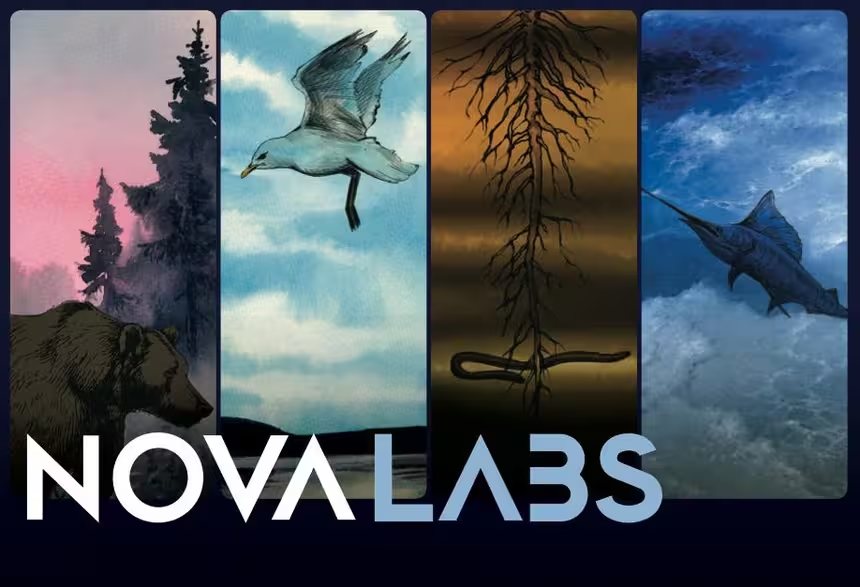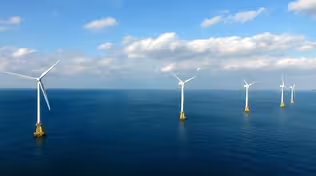
How Heat Pumps Can Help Cities Lower Carbon Emissions
Clip: Season 50 Episode 6 | 4m 17sVideo has Closed Captions
Landlords are switching from gas furnaces to heat pumps to reduce their carbon footprint.
Heat pumps are a key solution to help reduce carbon emissions. Instead of creating heat, they move heat from one place to another and have a much lower carbon footprint. But can we make them accessible to all?
Problems playing video? | Closed Captioning Feedback
Problems playing video? | Closed Captioning Feedback
Additional funding is provided by the NOVA Science Trust with support from Anna and Neil Rasmussen, Howard and Eleanor Morgan, and the Arthur Vining Davis Foundations. Major funding for NOVA...

How Heat Pumps Can Help Cities Lower Carbon Emissions
Clip: Season 50 Episode 6 | 4m 17sVideo has Closed Captions
Heat pumps are a key solution to help reduce carbon emissions. Instead of creating heat, they move heat from one place to another and have a much lower carbon footprint. But can we make them accessible to all?
Problems playing video? | Closed Captioning Feedback
How to Watch NOVA
NOVA is available to stream on pbs.org and the free PBS App, available on iPhone, Apple TV, Android TV, Android smartphones, Amazon Fire TV, Amazon Fire Tablet, Roku, Samsung Smart TV, and Vizio.
Buy Now

NOVA Labs
NOVA Labs is a free digital platform that engages teens and lifelong learners in games and interactives that foster authentic scientific exploration. Participants take part in real-world investigations by visualizing, analyzing, and playing with the same data that scientists use.Providing Support for PBS.org
Learn Moreabout PBS online sponsorship- [Narrator] On rooftops all over New York City, there is evidence that electricity is gaining currency.
In 2022, Americans bought more heat pumps than gas furnaces.
Landlord Lincoln Eccles was thinking about his son Ace when he made the decision.
- We've built an infrastructure based on oil and gas, burning things.
That's what we're used to but it doesn't have to be that way.
- - [Narrator] It's the third iteration for the early 20th century building he owns in Crown Heights, Brooklyn.
When it was built, they burned coal in a boiler to stay warm.
Now there's a heat pump for each of the 14 units.
Heat pumps work not by creating heat, but by moving it from one place to another.
Inside there's a fluid called refrigerant that boils at 40 degrees below zero Fahrenheit.
As long as it is warmer than minus 40 outside, the refrigerant picks up heat from air as it becomes a gas.
It flows into an electric compressor where it is put under pressure, adding more warmth to the gas.
The warm gas flows into the room unit.
As it heats the space, the gas itself condenses back into a liquid.
Now the liquid travels back out, flowing through a valve that lowers the pressure and thus the temperature, and the cycle starts all over again.
So in the winter, it can pump heat inside, and in the summer, the process is reversed to pump heat outside, cooling the room.
In Lincoln's building, each unit has its own wireless thermostat.
- Let's set the temperature.
Boop.
- [Narrator] Easy enough for his son to operate.
Lincoln hopes Ace will be the landlord here someday.
So do you think when Ace is your age, everything around us here will be electric?
- Definitely.
These two behind us are green.
These developments over here, they're green.
If they could do my building, they could do every building on the block.
(pensive music) - [Narrator] But heat pumps are not cheap.
And for us to reach net zero, nearly every building will need to make the transition.
So how can this technology become accessible to everyone?
That is precisely the goal for Donnel Baird.
- If we can do one building, we can do a whole block of buildings, and if we can do a block of buildings, we can do a whole city.
- He is the CEO of a startup called BlocPower.
- BlocPower wants to turn buildings into Teslas.
We wanna make them smart, green, healthy, all electric.
- [Narrator] Founded in 2014, BlocPower is making it more affordable for landlords to make the switch.
Lincoln Eccles' old building is one of about 2,000 conversions the company says it has spearheaded so far.
- We have everything that we need to green all the buildings now.
That's why it's so important that we focus on buildings 'cause we don't need any more innovation.
- [Narrator] Donell was able to mix the pressing needs of a landlord with a bad boiler and a planet boiling over into something attractive to Wall Street investors.
It's a company committed to executing the conversion at scale, bundling a lot of projects together to lower the cost and lower the risk.
- We show up and we say, look, we've got capital from Goldman Sachs and Microsoft to finance moving you to a functioning better system and it costs you nothing.
As a matter of fact, you're gonna save money because the payment that you make to us over 15 years is gonna be less than what you would pay to the oil company or to the gas company as an alternative - The arithmetic relies on incentives from the government and assumptions that the cost of heat pump manufacturing and installation will decline.
For BlocPower, the goal and the risks are big.
- He's in favor.
Lincoln Eccles says it's working for him.
- They just made it work at the end of the day.
It was a lot of back and forth, but it can be done.
It's not an impossible task.
Video has Closed Captions
Preview: S50 Ep6 | 29s | Here’s how the U.S. could reach net-zero carbon emissions by 2050. (29s)
Chasing Carbon Zero Sneak Peek
Video has Closed Captions
Clip: S50 Ep6 | 1m | A new film from NOVA examines technologies that could get us to carbon zero by 2050. (1m)
Why Induction Stoves Are Better for You and the Environment
Video has Closed Captions
Clip: S50 Ep6 | 2m 56s | Induction stovetops are an energy-efficient alternative to traditional gas stoves. (2m 56s)
Providing Support for PBS.org
Learn Moreabout PBS online sponsorship
- Science and Nature

Capturing the splendor of the natural world, from the African plains to the Antarctic ice.













Support for PBS provided by:
Additional funding is provided by the NOVA Science Trust with support from Anna and Neil Rasmussen, Howard and Eleanor Morgan, and the Arthur Vining Davis Foundations. Major funding for NOVA...





